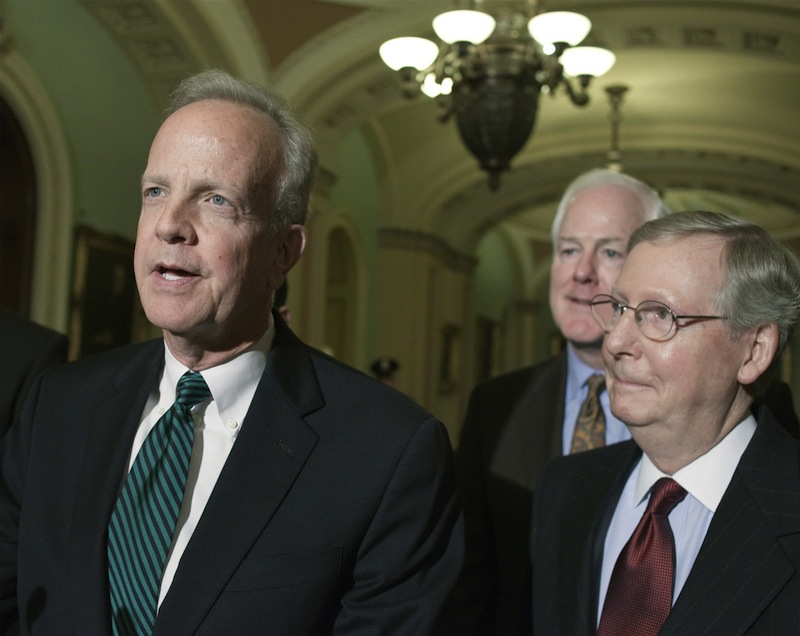You’ve heard it before: Republicans have a good opportunity to take back the Senate majority in the 2014 elections. They’ll likely need to win a net of six seats to make it happen, and at least six are up for grabs.
But the GOP has little room for error. And the majority, theoretically within their grasp, may be marred by a series of bruising primaries across conservative and swing states. Although the dynamics work strongly against the President’s party in mid-term elections, Democrats are salivating over the possibility of Republicans repeating their mistake in 2012 and nominating ultraconservative, gaffe-prone candidates who could throw winnable seats.
“The primaries that are damaging them across the country and going to make it impossible for them to win a majority,” Justin Barasky, a spokesman for the Democratic Senatorial Campaign Committee, the party’s election arm, told TPM on Monday.
National Republican Senatorial Committee senior adviser Kevin McLaughlin dismissed Barasky’s argument of a quasi-repeat of 2012 as “wishful thinking,” saying that primaries “are healthy for a democracy.” He told TPM the elections will be referendums on Democratic incumbents “cheerleading for President Obama’s agenda.”
The current partisan breakdown in the chamber is 54 Democrats (including two independents who side with them) and 46 Republicans. A special election later this year in New Jersey will likely tip the balance to 55-45. But the math favors Republicans, who in the elections next November will be defending 14 seats, all but one (Maine) in conservative states; Democrats are defending 21 seats, many of them in conservative and swing states.
Retirements of three longtime Democratic incumbents — Sens. Max Baucus, Tim Johnson and Jay Rockefeller — all but hand those seats to Republicans in Montana, South Dakota and West Virginia, respectively, where Democrats have thus far failed to recruit strong candidates.
If Republicans win those three seats, that would put them within three of securing the majority. And they’re bullish on four races that involve red state Democratic Sens. Kay Hagan in North Carolina, Mark Pryor in Arkansas, Mary Landrieu in Louisiana and Mark Begich in Alaska.
“I think red state Democrats like Hagan and Pryor and Landrieu are going to have to explain to their electorates, who largely disagree with virtually everything that the President has done in the last four or five years, why they so vocally supported these policies or why they were ineffective at stopping them,” said McLaughlin.
Barasky described each of those four candidates as strong advocates for their constituents and bashed GOP recruitment efforts in those states. “It’s an uphill climb for them,” he said. “They essentially have to sweep the most competitive races [to win the majority].”
Rough primaries could harm the GOP’s chances in three of those four races. Only in Arkansas do they appear to have a candidate who has cleared the field — first-term Rep. Tom Cotton, who is polling about even against Pryor.
But even if Republicans snatch three of those seats, brutal primary fights in Kentucky and Georgia stand to batter their eventual nominee, while Democrats have secured strong candidates who are polling well against their GOP opponents.
A heated fight between Senate Minority Leader Mitch McConnell (R-KY) and conservative Matt Bevin may clear a path for Kentucky’s Secretary of State Alison Lundergan Grimes in the general election. Two recent polls by the Public Policy Polling, a Democratic firm, found her in a dead heat with McConnell.
In Georgia, a seven-way GOP primary includes hard-right candidates like Paul Broun and Karen Handel, who are worrying Republican strategists by turning the race into a scorched-earth contest over who’s the most conservative candidate. Meanwhile, Democrat Michelle Nunn is all but guaranteed her party’s nomination, and a PPP survey last week found her ahead of, or tied with, all of the Republican hopefuls.






